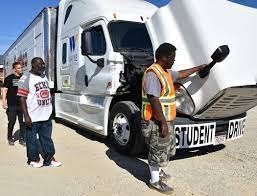Last Updated on March 10, 2025 by Bisma Sehar
Industrial forklift trucks are indispensable in warehouses, distribution centers, and manufacturing facilities. These powerful machines enable the movement and transportation of heavy materials, boosting productivity and streamlining operations. However, operating a forklift requires specialized skills and knowledge to ensure safety and prevent accidents. This is where industrial forklift truck training courses play a crucial role. In this article, we will explore the significance of these training programs and their benefits for both employers and employees.
Table of Contents
Enhancing Operator Safety
Safety is paramount in any industrial setting, and forklift trucks pose unique risks due to their size, weight, and handling characteristics. Accidents involving forklifts can result in serious injuries or even fatalities, as well as damage to property and goods. Proper training equips operators with the necessary skills to handle these machines safely, reducing the likelihood of accidents.
Forklift training courses cover a wide range of topics, including equipment operation, load handling, stability principles, manoeuvring techniques, and hazard identification. Participants learn how to perform pre-operational inspections, understand load capacity charts, and navigate various types of terrain and obstacles. They are also educated on the importance of wearing appropriate personal protective equipment (PPE) and adhering to workplace safety protocols.
Compliance with Regulations
Industrial forklift truck training courses ensure compliance with regulations and industry standards. Occupational safety regulations in many countries mandate that forklift operators must receive proper training and certification. Employers who fail to provide adequate training may face legal consequences and penalties.
Training courses are designed to meet the requirements outlined by regulatory bodies such as OSHA (Occupational Safety and Health Administration) in the United States and equivalent agencies worldwide. By enrolling their employees in accredited forklift training programs, employers demonstrate their commitment to upholding safety standards and maintaining a compliant workplace.
Increased Efficiency and Productivity
Skilled forklift operators are not only safer, but they also contribute to improved efficiency and productivity within industrial environments. Proper training helps operators understand the capabilities and limitations of forklifts, allowing them to maximize their utilization. They learn how to handle loads efficiently, optimize storage space, and minimize the risk of damage to goods and equipment.
Additionally, trained forklift operators are more adept at identifying potential hazards and taking appropriate measures to mitigate them. This proactive approach reduces downtime caused by accidents or breakdowns, leading to smoother operations and increased productivity.
Cost Savings
Investing in industrial forklift truck training courses can yield substantial cost savings for businesses in the long run. By preventing accidents and property damage, training helps avoid costly repairs, medical expenses, and legal liabilities. Insurance premiums may also be lower for companies that can demonstrate a commitment to safety through proper training and certification.
Furthermore, well-trained operators tend to be more efficient in their work, resulting in time and resource savings. They make fewer errors, require less supervision, and can handle complex tasks with confidence. The improved operational efficiency translates into cost savings and enhanced profitability for businesses.
Industrial forklift truck training courses are essential for ensuring workplace safety, compliance with regulations, and operational efficiency. By equipping forklift operators with the necessary skills and knowledge, these courses significantly reduce the risk of accidents, injuries, and property damage. Moreover, companies that prioritize training and certification demonstrate their commitment to safety, leading to cost savings, increased productivity, and a better working environment overall. Investing in forklift training is not only a legal requirement but also a strategic decision that benefits both employees and employers in the long term. For more information visit SB Skils Solutions
Apart from that, if you are interested to know about Industrial Equipment and Components then visit our Business category.
















